Which program are you applying to?
Accepted Admissions Blog
Everything you need to know to get Accepted
July 10, 2020

PhD Program Selection: Does School Ranking Matter?
Because tenure-track jobs are scarce, selecting the right PhD program is an extremely important decision that can have a dramatic impact on your future career. When it comes to making this important choice, many students often rely on school rankings to determine which PhD program is best for them, in hopes that banking on a school’s reputation will help them in the future. But is relying on rankings to decide on a PhD program the best way to proceed? Does a PhD from a top 10 institution automatically optimize your chances of securing the position of your dreams, post-graduation? In other words, when it comes to picking a PhD program, does school ranking really matter?
Not as much as you would think.
How PhD rankings help, and how they don’t
While it may be true that top 10 schools might have a great department in your field, it doesn’t necessarily mean that earning a PhD from one of these schools is the best decision for your future. Why? For the simple reason that the department might not have the right faculty to support you in your research goals.
If you’re considering enrolling in a PhD program , it’s important to keep in mind that the research world abides by specific rules. While the name attached to an undergraduate degree or an MBA can have a direct effect on career outcomes, the reality is different for doctorates. A PhD from a highly ranked school doesn’t automatically guarantee a higher starting salary after graduation, or that you will suddenly be put at the top of the pile of interviewees for a tenure-track position. In fact, when hiring committees look at freshly minted PhDs to fill a tenure-track position, they mainly look at the relevance and quality of a candidate’s research and how well this research fits with the needs of their department, rather than focus on the competitive selection process used by the school that issued the diploma.
Unfortunately, many students let rankings influence their decision when they come up with a list of PhD programs to apply to, and they buy into a name, rather than focusing on choosing a research environment where they can thrive. They often first create a list of programs based on a school’s ranking or reputation and then settle for faculty members on staff who “fit the bill” and who list their topic of choice among their areas of interest.
Prioritizing the faculty “fit factor”
If you find yourself at the stage of selecting a program and you want to find a program that will provide you with the best career options, it’s important to understand that your first priority should be to find the best expert in your field. You should be looking to work with someone who is a specialist in your area of interest and whose specialty is in direct alignment with yours.
Don’t settle for a faculty member who lists your topic as a secondary interest. Since your marketability in the job market as a recent PhD graduate will be determined by the people who have guided and supported you throughout your doctoral research, not picking the right research team can have a disastrous impact on your future career. This is why it’s important to take the right approach when selecting a PhD program.
How to proceed in creating your list of best PhD programs for YOU
Instead of conducting research on the top 10 programs in your field according to rankings, start by conducting research to find who the top 10 experts in your area of interest are. You don’t know who they are? Put your research skills to work!
- Start by looking at the most recent articles and books written on your topic or your area of interest and make note of their authors. Don’t forget to look at their bibliographies and keep track of the authors they cite, too.
- Rank them by importance. Which names are the most-often cited? Who seems to be the most important researcher on topics that interest you?
- Once you have 10 to 15 names, find out where they teach. Make a list of these schools. These are the schools where you should be thinking of applying.
Next steps: Department investigation
Once you have your preliminary list of schools, the next step should be to investigate the department where they work. Ask yourself:
- In addition to this potential advisor , are there any other faculty members who could possibly sit on your dissertation committee?
- How many people in the department have expertise that could benefit your potential research projects?
- What does student life look like?
Since your future in research will depend on the quality of the work you produce in graduate school, explore the resources offered by the department to support you throughout your doctoral studies.
Finally, modify your list by giving precedence to schools that give you the best options and eliminate schools that don’t. This should be your final list of schools.
Widen your net beyond the Ivies
Let’s face it: Most recognized experts do not work at an Ivy League school. In fact, they work for different tiers of schools all over the country, and they often work at institutions that might not have a shiny name but are very reputable and produce top research at the international level. By taking a route that puts an emphasis on the tools you need to conduct relevant research and positions you on the cutting-edge of your field, you will have taken the right steps to make sure that you have a list of PhD programs that will make your career options optimal after graduation.
By keeping in mind that the reputation of your advisor and research committee supersedes the importance of the school’s ranking, your final list of schools will guarantee that you make the right choice when the time comes to enroll in a program. You will be choosing the environment where you’ll be able to conduct research that will really make you stand out and put you on the path for a promising career in research!
Do you need help choosing the best PhD programs for you? Do you need guidance with any other element of the PhD application process? We’re here for you every step of the way. Explore our PhD Admission Services and work one-on-one with an expert advisor who will help you get ACCEPTED.

Related Resources:
- Plotting Your Way to a PhD , a free guide
- How to Write About Your Research Interests
- How to Be a Competitive PhD Applicant and Apply to the Best Programs for You
About Us Press Room Contact Us Podcast Accepted Blog Privacy Policy Website Terms of Use Disclaimer Client Terms of Service
Accepted 1171 S. Robertson Blvd. #140 Los Angeles CA 90035 +1 (310) 815-9553 © 2022 Accepted


PhD Admission Guide
Gain admission to your dream school, guide to phd admission.
While some students swear off further education after undergrad, some love the thrill of intellectual discovery and research. For these students, graduate school is a natural choice. Graduate degrees are separated into “professional” and “academic” categories. Professional degrees are JDs and MDs, while academic degrees are PhDs (literally “Doctorates of Philosophy” regardless of what field you actually study).
Whether or not you need to pursue a PhD depends entirely on what career you wish to have. Some require higher education, while many others do not. In this guide we’ll go over how to apply to PhD programs, what they are looking for, and how the application process works. This guide is focused on the US and Canada; Europe has a system which is simultaneously similar and very different.
What PhD Programs Look For

PhD programs want to make sure you are prepared academically for the rigors of the program, and that you have a concrete research goal in mind. PhD programs culminate with each student answering a research question they devise, contributing new knowledge to the world in the process.
Thus these programs seek to evaluate your intellectual ability, research goals, previous research experience, and how you will contribute to their program. To determine this, they ask for the following:
Letters of Recommendation
We’ll go through each of these in turn, and explain what graduate programs are looking for from each.
Your GPA in undergrad is the single most important factor in PhD admissions. If your GPA is too low your application will be dismissed out of hand. While there are no hard limits, we suggest a minimum GPA of 3.5 for serious contention, especially at top schools. If your GPA is below 3.0 then you will likely not get admitted into any PhD programs.
The reason for this is that PhD programs are a lot of work. Being intelligent is necessary, but is far from sufficient alone. Everyone in PhD programs is intelligent, and everyone is also willing to do the work. Your GPA is seen as the primary indicator of your willingness and ability to do academic work to a high standard, and your preparation for the rigors of a PhD program.
Along with your overall GPA, schools request your major GPA. This is your GPA when calculated only using courses in your major. This is usually expected to be higher than your overall GPA. Your major GPA should be over 3.5.
While taking harder courses in undergrad is a great experience, they can also harm your overall GPA. Of course, the best approach is to take very hard classes and do well in them, but this is not always possible. We recommend taking a blend of courses, so you are never overloaded, and able to give each the attention it needs to do well.
Academic Preparation
Your GPA and transcript is also used to judge your academic preparation for the program. You should have a solid grounding in the field, and have taken advanced courses as well. Taking graduate level courses in undergrad can exemplify this.
Some PhD programs also require research languages. This is more common in the social sciences and humanities, but all students will benefit from knowing other languages well enough to do research in them. You should look up language requirements when researching programs to apply to.
The Graduate Record Examinations (GRE) is a standardized test meant for students who intend to apply to graduate programs. Both MA and PhD programs ask for GRE scores. Much like the SAT or ACT in college exams, the test is meant to be a standardized measure of academic preparation and logical skill.
The test consists of six sections. The first is writing, next are two on verbal reasoning, then two on quantitative reasoning, and finally a research or experimental section, meant to test new questions. The entire test is offered on the computer, with one minute breaks after each section, and a ten minute break after the third section. While there is also a paper-based test, almost all testing is now done on a computer. Due to the pandemic, both testing centers and at-home testing are offered. The GRE is a multi-stage test, and how well you do on earlier sections determines the difficulty of later sections and questions.
The verbal sections each consist of 20 questions, to be answered over 30 minutes. The whole is scored on a scale of 130-170. The quantitative section is scored the same, and consists of two 20 question sections, each of which should be completed in 35 minutes. The writing section is scored from 0-6. For this section, you write an essay on a given issue in 30 minutes, and offer a response critiquing a provided argument for 30 minutes.
Your total score from the GRE is given from 130-170. While the exact scores you need to enter graduate school vary, higher is better. In addition, some programs only care about your verbal score, while others only care about your quantitative score. How much weight each program puts on GRE scores varies greatly.
We recommend studying for the GRE for some time before testing. You can take the GRE up to five times per year, but must wait at least 21 days between testing dates. Only scores from the past 5 years will be released or considered by graduate programs.
Curriculum Vitae
This is akin to a resume, but is dissimilar enough that the two cannot be used interchangeably. The purpose of a CV is, like a resume, to detail what you have accomplished academically and in your career. It is far more focused on academics however, and is widely used for academic careers.
We recommend finding a template for a CV online, or asking your college’s advisors for help in creating one. If you already have a resume, then you will easily be able to convert it into a CV.
What admissions officers are looking for in your activities is primarily signs of research. This should be in whatever field you intend to pursue a PhD in. Publications are also incredibly valuable. All of academia runs on publication, and getting an early start helps your career at every step.
You should try to do research while still in undergrad. What this looks like depends entirely on what field you are pursuing. While the research does not have to exactly line up with what you wish to pursue, it should teach you skills which are cross applicable. Higher level academic research has its own set of methods and language which must be learned, and students who are already familiar with the forms and structures of research have a leg up in graduate school.
Publication is not required, but is nice to see. If you have completed a master’s degree, you should have some publication history; of your thesis if nothing else. Speak with your academic advisors about getting your work published.
Each graduate school you apply to will ask for an essay. You will be able to use the same basic form for each, but will need to edit it to be about the particular program you are applying to. Most schools only require a single essay, although some programs ask for a second on diversity.
The purpose of this essay is to explain your research interests, what you have studied, your intended area of specialization, and what your focus will be on. Every PhD student is asking and trying to answer a very specific research question. This question forms the basis of their dissertation, and will be the focus of your life for several years if you are accepted.
Thus the essay is the most important part of your application. Your grades and GRE are required to see if you are academically ready for graduate school, but the essay lets readers know if you are a match for their program, and serious about your research.
Your essay should begin by stating which program you are applying to, and why. Next, go through your previous academic experience in the field, both coursework and research. You don’t have to go through every class, but cover the ones most relevant to your desired research topic.
You should discuss any prior research you have done in the field. If you completed a thesis for your undergraduate degree or a master’s program, cover that here. If you have any publication credits, cover those as well. This should relate directly to the field you are trying to enter. If you wish to pursue lab work, discuss your previous experiences; if instead you are pursuing field work, talk about your experiences there.
Next you should talk about the research you specifically wish to pursue through a PhD. You don’t need to have an exact research question worked out, but it is helpful to have some idea; you should at least know the subfield you will be focusing on. The more specific you are, the better. Having some discussion of methodology can be nice, but is not always necessary.
If there are any ongoing research projects ongoing at the school you wish to work on, cover those next. You should discuss how these projects specifically relate to your own research interests. Finally, you should talk about which professors you wish to work with. Professors take on graduate students to advise, and you ideally want one with a specialization at least tangentially related to your field of interest. The more closely related the professor’s studies are to your own, the better.
You will be able to leave much of this essay the same for each school you apply to, changing only the name of the program, the research projects, and the professors you wish to work with.
This essay should be a page and a half to two pages long, single spaced. You should go into sufficient detail for those reading it to understand the research you want to pursue. These essays are reviewed by the faculty who run the department, and they make the admissions decisions for PhD programs. There are many more applicants than there are spaces, and admissions rates are low. The more specific and detailed you are in this essay, the better the faculty will understand your research aims, and the better your chances will be.
Diversity Statements
Not all programs ask for these, but you will likely be able to reuse the same essay for those that do. The purpose of the diversity statement is to see what unique points of view and experiences you will be able to contribute to the program. PhDs are about learning, and the more viewpoints and ideas within a program, the broader the experience will be.
If you are a member of an underrepresented group, an immigrant, come from an underprivileged background, or come from an area which is generally underrepresented, we suggest discussing that in this essay. You should not write an essay about your interactions with members of these groups, or a study abroad experience.
Above all, this essay should be authentic to you and your experience. The goal is to show how your background has shaped you as a person, and how it impacts your view of the world.
As with college applications, letters of recommendation are required for PhD admissions. These tell admissions committees who you are as a student and researcher, and give their opinion on how you will perform when doing graduate level work. Academic fields are small and often insular, and the professors writing your letters will often be known by those reading them, either by reputation or in person.
Programs ask for two to four letters. These should primarily come from professors who know you and your work well. If you had a thesis advisor, they should write one of your letters. If you’ve worked doing research for some time, then a mentor or lab director can also be a good source of a letter, even if they haven’t taught you in class. Letters should not come from non-academic sources, unless you have worked professionally in that field.
While you have the option to read the letters that are written for you, you should always waive that right. If you don’t trust your writers to craft good letters for you, then you shouldn’t be asking them for letters. Asking to see letters is considered a sign of lack of trust, and is gauche. Many professors will decline to write letters if you insist on seeing them.
You should ask for letters well in advance of when they are due; we recommend at least a month or two. If you are asking non-tenured faculty for a letter, more leeway is recommended, as they have more on their plate, and are often more stressed. You may need to send a reminder as deadlines approach. You should also share a copy of your essay with letter writers, so they know exactly what subfield you intend to pursue, and can discuss this in their letters.
Finally, you should be aware of politics when asking for letters. Some professors do not like each other at all. If you are seen as the protege of a professor who others detest, this can impact your admissions chances. Always discuss which schools and programs you are applying to with your letter writers. You should also discuss your choices of writers with an advisor (for example a thesis advisor) familiar with the field. Academic politics are incredibly petty, but if you plan to pursue a PhD you need to be aware of the game, and how it is played.

If your application passes the first review, you will be invited to do an interview. This will be with faculty in the program you are applying to. This is to further get to know you, and to understand your research objectives.
You should be able to clearly explain what you want to research, and how this program will help you do so. The people talking to you will all be familiar with the field, though not necessarily your specific subfield. They are looking for your ability to communicate and explain your view. Be prepared to answer some questions about the specifics of your goals, though it’s ok if you don’t know everything right now.
Interviews are generally in person, though due to the pandemic, virtual interviews have become more common. This is also your chance to ask any questions you have about the program you were unable to find answers to online. You can practice for this interview with an advisor or mentor; many schools have career centers which hold mock grad school interviews as well.
When and How to Apply to Grad School
There is no unified platform for PhD applications. Instead you must apply to each program individually, through the school’s website. This will mean filling out information multiple times, but they fortunately don’t ask for much. Once you have your documents in order, the rest is personal, demographic, and contact information.
You will need to pay to have your GRE scores sent to each school you apply to. Even though this is all electronic, they still charge dearly for it.
Applications are generally due in December or January, with interviews held over the next few months. Applications open in September or October. We recommend getting your applications in before the due date, though most programs don’t use rolling admissions. Each program sets their own deadlines, so you should track when each of your applications is due carefully to make sure nothing gets overlooked.
Paying for Grad School
PhD programs are for the most part fully funded. This means you will not be paying tuition, and will also get funding to live on. This funding is generally contingent on academic standing, and doing work TAing, teaching, or on ongoing research projects (or most commonly, all of the above). Many grad students also work full or part time to support themselves.
While you will not need to take on additional debt to pay for graduate school, you will not be well paid either. While the exact amount graduate students receive varies by school and program, it is generally in the range of $20-30,000 annually. This goes towards food, housing, and supplies.
While you are in a PhD program, you will not have to make payments on any government loans you took out to pay for undergrad, though they will continue to accrue interest. Making payments on them during grad school is difficult, but will greatly cut down on the amount you need to pay back later.
There are also outside scholarships available to help pay for graduate studies. While the amounts offered by these vary, most are small. They can help greatly with paying for the necessities however, and applying to them is usually worth the time investment.
Grad School Admission FAQ
Now we’ll answer some of the most common questions about applying to PhD programs.
Can older students apply?
Yes. Many professionals return to school for a PhD long out of undergrad. We suggest taking some courses at a local university in the field you plan on entering before you do this however. Academic research advances quickly, and this will familiarize you with the latest developments. Further, this will introduce you to professors who can provide you with letters of recommendation.
What are my odds of acceptance?
This depends on both your field and program. Generally, however, it is quite difficult to gain admissions to a PhD program, and admission rates hover around 10%. Only the best students get accepted, and this is even more the case at the top schools and programs.
When should I start thinking about applications?
When you choose your major, you should decide what level you want to reach within that field. Some majors lend themselves to PhDs if you want to work in that field, while others allow employment at various levels.
Where should I apply?
You should find programs with professors who are dedicated to your particular subfield. A prestigious institution which does not focus on your area is far less useful, regardless of how famous its name is. You are looking for someone who will be able to advise you, and help you perform worthwhile research. Further, professors are looking for students studying fields similar to their own when they admit graduate students.
How long are PhD programs?
Generally programs last 4-5 years, though this can vary based on field. The exact structure of the programs also varies a lot based on field and program.

Ivy Scholars is the leading educational consultant in Sugar Land, Texas, providing admissions coaching, test prep, and more to help students enroll at top tier schools.

Get In Touch
Call us now: (281) 215-5148
Houston: 4265 San Felipe St, Suite 1100, Houston, TX 77027
Get Started
Subscribe for updates, © all rights reserved.

- Skip to main content
- Prospective Students
- Current Students
- Apply Apply
- Follow Us

Is Getting a PhD Worth It?

Perhaps you’re finishing up a bachelor’s or master’s degree, or maybe you’ve hit a wall in your career. Now you’re wondering: Should I get a PhD? In the long run, is this the best choice for my career and personal goals?
You may have friends who have completed doctorate programs or even observed coworkers or professors excelling with PhDs but wondered if it’s the right fit for you. There’s usually a series of roadblocks between the initial daydreaming and enrolling. You hesitate, wondering if this is the right time, if it will pay off, or if you’ll be able to succeed.
The short answer: Yes. Most PhD students will tell you the time and effort are worth it. The long answer? Ultimately, only you can decide that but the pros outweigh the cons.
What benefits are there to earning a PhD?
Well, most importantly, you’ll get two new letters in front of your name: Dr. Knows A. Lot.
Reputation Building
Jokes aside, earning a PhD earns you credibility . Employers, whether within academia or off-campus, understand the discipline, knowledge, and tenacity required to complete a doctoral program.
In most cases, completing a PhD program is enough for others in your field to consider you an expert. Pursuing and completing a PhD shows all future employers you know your industry and you have the fortitude to work hard.
Return on Investment
It’s not always easy to calculate the monetary value of a PhD, but many PhDs will tell you that the return they’ve received on their investment (ROI) was more than worth it. When it comes to ROI , it matters where you get your PhD.
Depending on your field and the school you choose, the ROI on a PhD is made significantly higher if you don’t have to pay tuition. Many schools, SMU included, offer fellowships and stipends for PhD students, often in addition to a full tuition waiver. This isn’t meant to convince you that PhD students are raking in cash — just a reminder that tuition isn’t necessarily a burden for doctoral students. PhD students do get paid
Pursuit of Passion
You may have experienced the dread that comes with a job search where you’re under qualified. You see the posting. You notice the employer and job title. Wow, this is your dream job . You skim the description and think, “I could probably do that!”. You get to the bottom, “Preferred Qualifications”. Yikes. You’re not quite there. Your PhD will open those doors, remove the barriers, and welcome you to the highest level of your career. Gone are the days of being under qualified. This is your time to shine.
Remember those doors that were closed before? Your PhD helps you find a network of people who can help you open them. Your classmates turn into colleagues, your professors into trusted friends, and those barriers start to fall down as you surround yourself with people who share your passion.
Oh yeah, that little thing. Your passion. The subject and field you’ve been dreaming about since you were a child. Or maybe just since undergrad. It’s become part of your personal identity. Pursuing a PhD allows you to learn more, dig deeper, and climb higher in the field that you already enjoy. Even if you’re not looking to stay in academia forever, the PhD in your chosen field gives you the ability to stay a while longer and decide how best to use your skills.
What are the Reasons Not to Get a PhD?
Getting a PhD has a lot of benefits, but there are risks to consider, too.
The time commitment : this may take years. PhD programs take an average of 6 years to complete.
The financial commitment: if you’re not in a fully-funded program, this may cost a lot. Not only in tuition, but in “lost wages,” too. Most PhD students don’t have time to work on top of earning their degree.
But, the financial commitment is often offset by the earning potential of a PhD. On average, PhDs make over $30,000 more annually than those holding only a bachelor’s degree, but keep in mind that number varies between the humanities, business, and science industries.
The energy commitment: earning a PhD can be hard work. The good news is you’re not in it alone at SMU. We offer a robust career services office and dedicated student support services for PhD students like housing, counseling, and community connections.
The risk: what if this doesn’t work out? But what if it does?
Have you ever considered that in pursuing a PhD, you’ll be the expert on your chosen topic? You’ll have your classmates to lean on, but your thesis is specific to you. Your dissertation, though a lot of work, will put you as the thought leader of that specific topic. Combining your passion, credibility, network, and dreams to launch into your next phase of life.
So, is a PhD worth it? We think so.
Learn more about
doctoral degrees at SMU, and how you can choose the right program and thrive in it, in our Guide to Getting a PhD.

Request more
Information.
Complete the form to reach out to us for more information
Published On
More articles, recommended articles for you, unlocking possibilities: what can you do with a phd in english.
The world of academia has long been associated with the pursuit of knowledge, scholarly research...
Is a PhD in Humanities Worth It?
If you’ve recently completed an undergraduate degree in a field like English, History or Religious...
What Does Fully Funded Actually Mean?
You may have heard that many PhD programs are fully funded — universities pay doctoral students to...
Browse articles by topic
Subscribe to.

Does It Matter Where You Get Your PhD? PhD Program In Universities
Let’s get straight into it – Does it matter where you get your PhD? Will going to a prestigious university for PhD better? Straight answer, yes, and no. There are multiple facets you can look at when exploring this question, and if this strikes your interest, read on.
This article examines how the reputation of an institution, the quality of its programs, and the networking opportunities it offers can impact you and your career prospects.
5 Ways Where You Get Your PhD Can Matter
There are several reasons why it matters to go to the best universities to get your PhD. Here’s a few for you to think about:
Prestige Opens Doors
The prestige of an institution like Harvard, MIT, or Cambridge isn’t just about the name on your diploma. It’s about the doors that open as a result.
Top-ranked universities often have extensive alumni networks and partnerships with leading industries. This can lead to unique career opportunities post-graduation, especially in highly competitive fields.
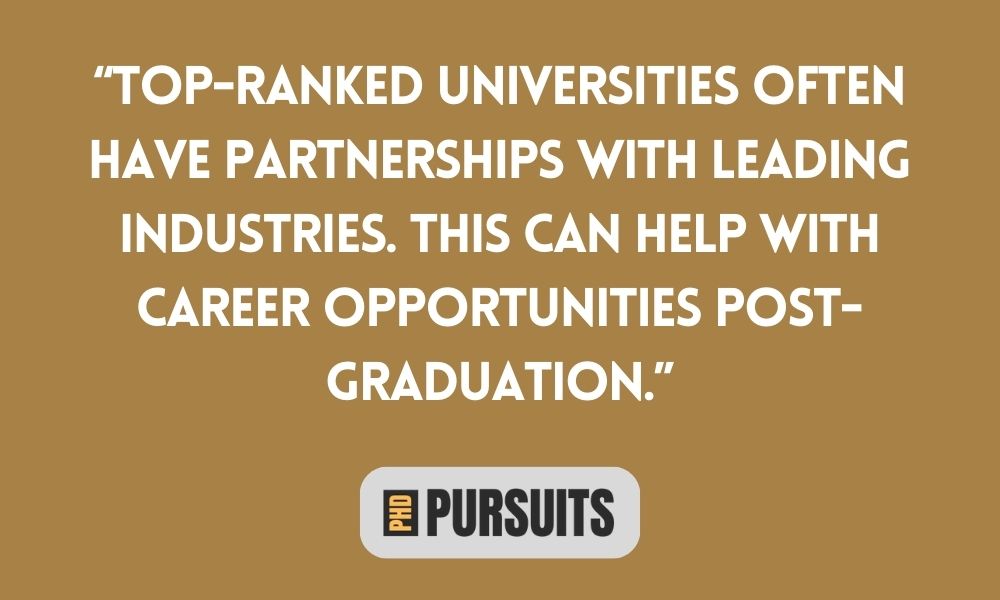
Prestigious Universities Often Have Quality Supervisors
The quality and reputation of your advisor can significantly influence your academic journey and beyond.
An advisor from a highly ranked university is often well-connected within the academic community. They are more likely to be found in prestigious universities as these universities have the funding to retain them.
This should provide you with not just guidance but also access to collaborative research projects that can define your career.
Good Universities Have Resources To Help Your Research
The resources available to PhD students can vary greatly between universities. Top programs tend to offer:
- cutting-edge research facilities,
- generous funding, and
- access to a broad spectrum of conferences and academic events.
This can greatly enhance the scope and impact of your research.
Stimulating Academic Environment
The academic environment and peer group at prestigious universities can be incredibly stimulating. Being surrounded by motivated and talented peers can push you to excel and expand your own research interests and capabilities.
Helps Your Academic Journey Later On
For those considering a career in academia, the university’s reputation can be a deciding factor in securing a tenure-track position.
Faculty positions are scarce, and candidates from top-ranked universities often stand out in the selection process. Universities also enjoy talking about having staff members from prestigious universities.
5 Ways Where You Get Your PhD Does Not Really Matter
Its your research, not university.
The essence of a PhD is your research. What truly sets you apart is the quality and impact of your work, not just the university’s emblem on your diploma.
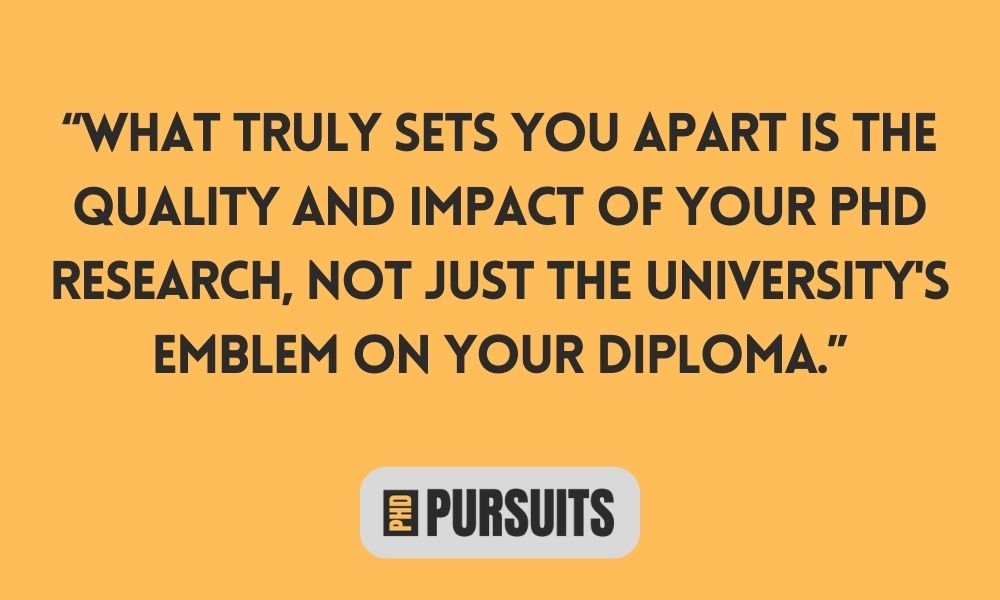
In fields like computational science or liberal arts, groundbreaking research can emerge from anywhere, even if you are working in regular universities. It’s your drive and innovation that matter.
Good Supervisors Matter More Than University
The advisor-student relationship is pivotal. A supportive and well-connected advisor can provide invaluable guidance, regardless of the university’s prestige.
They can open doors to collaborations and postdoc opportunities, shaping your career path significantly. The best thing is, excellent supervisors can be found outside prestigious universities too.
Your Own Networking Matters More
Networking within your field can sometimes outweigh the university’s name. Coming from a prestigious university may help you initially in the networking phase, but its your drive, and results that matters in the end.
Engaging with peers at conferences, participating in collaborative research projects, and contributing to academic forums can boost your visibility and opportunities, no matter your academic home base.
Skills And Experience First, Before University
The skills and experience you gain during your PhD journey are critical. Universities, irrespective of their rankings, offer diverse learning environments. Some may offer:
- unique courses,
- hands-on research opportunities, or
- interdisciplinary projects
These unique learning opportunities may align perfectly with your interests, and may not be something prestigious universities may offer.
Learning Community May Be Better
Consider the broader academic environment. A lower-ranked university might offer a close-knit community, personalized mentorship, and less competition for resources, fostering an ideal setting for some students to thrive.
Prestigious universities may see more competition, which may unfortunately result in unruly or worse, sabotaging behaviors.
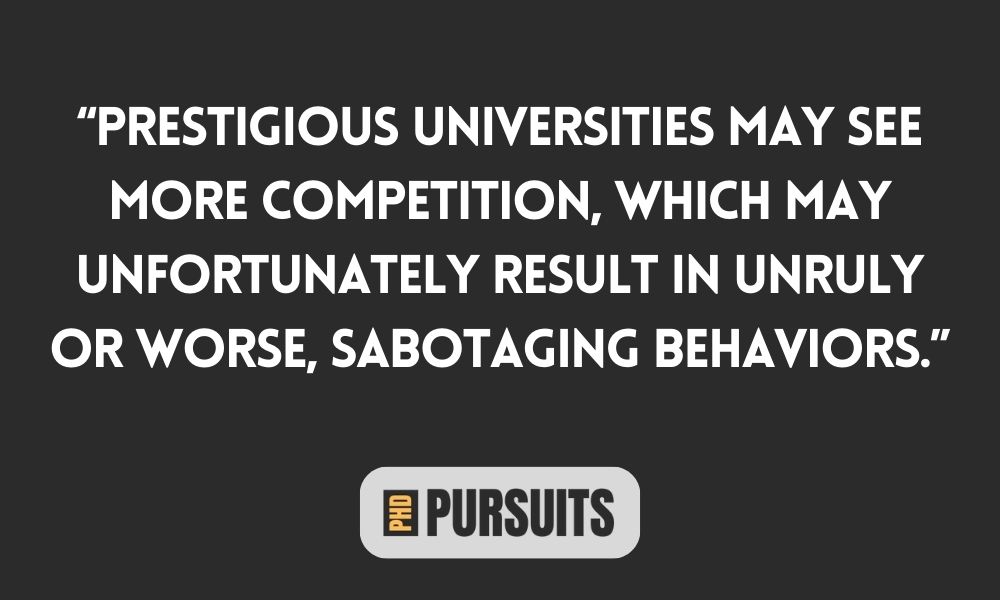
Are There PhD rankings for Graduate Schools?
The answer is yes, but they’re more nuanced than you might think.
Rankings for PhD programs often come from academic publications and research organizations that evaluate universities based on various criteria. These may include
- faculty reputation,
- research output,
- funding, and
- student outcomes.
For instance, top universities like Harvard, MIT, and Cambridge consistently appear at the top of these lists, especially in fields like engineering, sciences, and humanities.
However, the relevance of these rankings can vary significantly depending on your field of study. For specialized areas, such as marine biology, you might find that smaller, less globally renowned universities offer highly ranked programs.
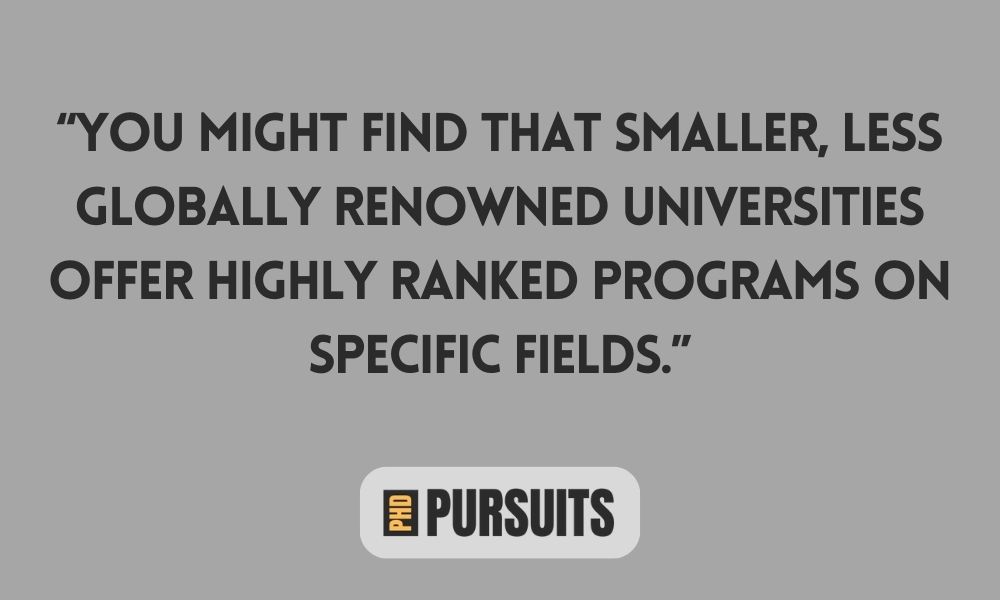
This is likely due to their focus, cutting-edge research and faculty expertise.
Moreover, the fit between a PhD student and their advisor, the research group, and the broader academic environment can be just as crucial as the ranking itself.
A highly ranked program might not be the right place for you if it doesn’t align with your research interests or if you prefer a different type of mentorship and community.
Would A PhD From Top-Ranked University Affect My Career Prospects?
Earning a PhD from a top-ranked university like Harvard, MIT, or Cambridge can be a game-changer for many, opening doors in academia and beyond. But does it really matter in the grand scheme of your career?
The prestige associated with such institutions can provide an initial boost, particularly in competitive fields. A diploma bearing the name of a top university carries weight, potentially making your CV stand out in a stack of job applications.
This is especially true in academia, where the pedigree of your graduate school can influence your prospects for tenure-track positions.
Moreover, top-ranked universities often boast leading-edge research facilities and funding opportunities. This means you’re more likely to engage in cutting-edge research projects, under the guidance of renowned professors.
Such experiences can only enhance your research skills, even if you start your PhD without a masters degree.
However, it’s not just the university’s name that counts. The reputation of your advisor and the quality of your own research can play equally significant roles.
Collaborating with a well-respected professor on impactful research projects can set you up for success, regardless of the institution’s overall ranking.
That said, in non-academic fields, the situation might differ. Here, the practical skills and experience you’ve gained during your PhD, and how well you can apply them, often matter more than the university’s prestige.
Which Universities Are Highly Ranked For Their PhD Programs?
Here are eight universities renowned for their PhD programs. For more information you can always visit the QS university rankings website , where world’s universities are ranked.
- Harvard University : Its PhD programs, particularly in law, business, and the sciences, are renowned worldwide. The university boasts an extensive library system, state-of-the-art research facilities, and a faculty that includes multiple Nobel laureates.
- Massachusetts Institute of Technology (MIT) : Known for its cutting-edge research in engineering and physical sciences, MIT fosters an innovative environment where PhD students work on solving complex real-world problems. The emphasis on interdisciplinary research allows students to explore the intersections of technology, science, and society.
- University of Cambridge : This historic institution offers a diverse range of PhD programs across the humanities, social sciences, and natural sciences. Cambridge is known for its unique college system, providing a close-knit community for students and faculty. The university’s rich tradition of scholarship and modern research initiatives make it a top choice for doctoral candidates.
- University of Oxford : Oxford is renowned for its outstanding contributions to literature, politics, and the sciences. Its PhD programs are characterized by rigorous scholarship and a personalized tutorial system that fosters close mentorship relationships.
- Stanford University : Stanford stands out for its entrepreneurial spirit and strong connections to the tech industry. Its PhD programs in computer science, business, and education are particularly notable.
- University of California, Berkeley : Known for its activism and social change legacy, UC Berkeley offers top-ranked PhD programs in public policy, environmental science, and computer science. The university’s commitment to social impact and public service is reflected in its research.
- Princeton University : This Ivy League university is esteemed for its programs in mathematics, physics, and humanities. Princeton’s PhD students often highlight the close-knit academic community and the mentorship they receive.
- University of Chicago : This university is particularly acclaimed for its contributions to economics, sociology, and law. The University of Chicago emphasizes rigorous analytical research and interdisciplinary studies, providing a stimulating environment for PhD students.
It Does Matter Where You Get Your PhD, But Not So Much
While the choice of university for your PhD can have certain implications, it’s crucial to remember that personal initiative, the quality of your research, and the relationships you build along the way hold substantial weight.
The right fit for your academic and professional aspirations may not always align with traditional notions of prestige. Ultimately, success in academia and beyond is shaped by a confluence of factors, with the name on the diploma being just one piece of the puzzle.

Dr. JW Ong holds academic degrees, including a Ph.D. in Applied Linguistics from universities in New Zealand, Malaysia, and the UK. He started PhDPursuits.com as a way to share the experience he wish he would have had known before embarking on his PhD.

Leave a Comment Cancel reply
Save my name, email, and website in this browser for the next time I comment.
Here’s What Graduate Schools Think About Your College
Admissions experts say graduate schools consider applicants from elite and non-elite undergraduate colleges.
What Grad Schools Think of Applicants

Getty Images
It is appealing to a graduate school if a student can think critically and be independent at a large university, experts say.
Students who attended lower-ranked universities for their undergraduate degree might think they have a smaller chance of getting accepted into their desired graduate school program.
However, experts say graduate schools don’t always choose students who attended a higher-ranked or elite college over others. Graduate programs want to see well-rounded students who are impressive scholars in their field.
Do Grad School Applicants From Top Colleges Have an Edge?
While undergraduate alumni of an institution with graduate school programs may have an advantage, students from higher-ranked undergrad institutions aren’t automatically granted admission, says Rachel Blankstein, co-founder of Spark Admissions in Massachusetts.
“All things being equal, if you were having a student – let's say from a school that was ranked No. 100 – and they had the exact same grades and scores and resume to a kid from a school ranked No. 2, for example, it is true that the school might be more interested in that student from the school ranked No. 2. But, that's only if all of the other variables were the same at the time,” Blankstein says.
Students should gain as much experience as possible in their field during undergrad, regardless of how elite their college was, if they want to be considered a competitive candidate.
High-ranking colleges tend to offer students lots of outside-the-classroom opportunities to gain experience, for instance through publishing undergraduate research, conferences and faculty mentorship. However, students can find similar experiences at lower-tier or smaller universities, says Kristen Willmott, senior private counselor and graduate school admissions director at Top Tier Admissions, based in Massachusetts and Vermont.
“I think that just because you landed at Harvard or Yale or Princeton for college doesn't necessarily mean you're a shoo-in for graduate school at a university that's on par with that or even a slightly lower-tier university,” Willmott says. “We do sometimes see students where they work their tails off in high school and they landed at a top college, but when they were there they attended class and that's about it.”
Sadia Khan, director of admissions at the Middlebury Institute of International Studies at Monterey, which is a California-based graduate school of Middlebury College in Vermont, says the admissions team looks for students who have a high GPA and a strong academic background.
“It doesn't really matter where you went to for the undergraduate institution,” Khan says. “However, if your GPA is not ideal, then we do also look at, was this a really competitive college? Was this a really competitive major? Was this a more tough major? Was it a STEM major? If they're coming into one of our STEM programs, then we look at specific courses.”
For some students, a graduate school program that is prestigious or has a high acceptance rate might not be the best choice for their career goals, Willmott says.
“We want students to land at universities that are the best possible fit for them, that jive with what they're seeking when it comes to their academic niche, their scholarly pursuits, their research interests, their community experiences that they want to have on campus, and their geographic location preferences,” Willmott says.
How to Be a Strong Graduate School Candidate
Graduate school admissions officers consider multiple factors when looking for standout candidates, including grade point average, standardized test scores and a resume of experiences related to the field a student wants to enter.
Blankstein says all graduate programs have some form of a personal statement in the application, where students should explain why they want to apply, what they will do after their degree and their qualifications.
For example, the personal essay questions in the fall 2023 MBA application for Harvard Business School in Massachusetts ask prospective students to write about their experiences and what more the selection committee should know about them.
Similarly, the Master of Science in Integrated Marketing program application for Northwestern University in Illinois asks students to answer several questions, including about their personal identity and career path.
“They're really looking at the whole profile. And they really need you to have the grades and the scores and the resume, and that your essays and interviews are also exactly ... at the level that they're hoping to get,” Blankstein says.
Advice for Graduate School Applicants Who Attended Less Competitive Colleges
Nellie Gaynor, MBA and grad admissions counselor for the admissions consulting firm IvyWise, says students who attended public and larger research universities should use their time at the institution to their advantage.
She says it is appealing to a graduate school if a student can think critically and be independent at a large university.
“I think that speaks volumes to who you are as an individual as well, right? Because you are able to navigate these unknowns and find your path and figure out what is going to be most interesting to you, what do you want to get involved in,” Gaynor says.
Students who want to attend their dream graduate program should also have a clear vision of their end goal.
“What's so important that I think people don't realize enough is how much planning goes into these processes,” Blankstein says. “For many of them, it takes a few years to get the requirements done, whether if there's course requirements, to study for whatever standardized test is required, to build the resume. And so thinking about it over time and planning is so incredibly important.”
Perspective From Current and Former Grad Admissions Officers
While crafting a strong application for graduate school is important, building connections at the university a student wishes to attend is also key to success, says Willmott, who is a former admissions and financial aid officer for Harvard University.
Willmott says she coaches her students to reach out to one to three faculty members at their targeted graduate programs.
“Those are unique ways that you can stand out above other applicants, by becoming known by the faculty where you’d hope, ‘OK, this person could be my advisor. How can I make a name for myself before the application even hits the admissions read table at the university?’” says Willmott.
Admissions officers also look for students who understand the program they applied for and how it would fit in with their long-term career goals, Khan says.
"It's a big investment in time and money, and we want to make sure that they are able to get the kind of return that they're expecting in terms of not just the education but also in terms of their career," Khan says.
Gaynor, a former associate director of admissions for the Wharton School at the University of Pennsylvania , says aside from what kind of college a student attended, all graduate schools look for students who took advantage of opportunities in their field, which could be completing internships, studying abroad, taking on leadership opportunities or conducting research in a lab.
“All of that is going to help you, essentially, to land a good job post your graduate school experience, which will then play into this factor of making you a strong graduate school application,” Gaynor says.
Top Mechanical Engineering Programs

Tags: education , colleges , students , graduate schools
You May Also Like
How to get a perfect score on the lsat.
Gabriel Kuris May 13, 2024

Premeds Take 5 Public Health Courses
Rachel Rizal May 7, 2024

Fortune 500 CEOs With a Law Degree
Cole Claybourn May 7, 2024

Why It's Hard to Get Into Med School
A.R. Cabral May 6, 2024

Pros, Cons of Unaccredited Law Schools
Gabriel Kuris May 6, 2024

An MBA and Management Consulting
Sammy Allen May 2, 2024

Med School Access for Minority Students
Cole Claybourn May 2, 2024

Different jobs with med degree
Jarek Rutz April 30, 2024

Completing Medical School in Five Years
Kate Rix April 30, 2024

Dealing With Medical School Rejection
Kathleen Franco, M.D., M.S. April 30, 2024

Pros and Cons of Earning a Master's Degree Before a PhD
Martin Barraud / OJO Images / Getty
- Choosing a Graduate Program
- Tips & Advice
- Admissions Essays
- Recommendation Letters
- Medical School Admissions
- Homework Help
- Private School
- College Admissions
- College Life
- Business School
- Distance Learning
- Ph.D., Developmental Psychology, Fordham University
- M.A., Developmental Psychology, Fordham University
As a potential applicant to graduate school you have a great many decisions to make. The initial decisions, such as what field to study , may come easily. However, many applicants struggle with choosing what degree to pursue, whether a master’s degree or PhD is right for them. Others know what degree they want. Those who choose a doctoral degree sometimes wonder if they should first complete a master’s degree. Do you need a master’s degree to apply to a doctoral program?
Is a master’s degree an essential prerequisite for gaining admission to a doctoral program? Usually not. Does a master’s degree improve your odds of admission? Sometimes. Is it in your best interest to earn master’s before applying to PhD programs? It depends.
Pros and Cons of Earning a Master's Before Applying to PhD Programs
There are both advantages and disadvantages to earning a master’s before applying to PhD programs. Below are some of the pros and cons:
Pro: A master’s degree will introduce you to the process of graduate study.
Without a doubt, graduate school is different from college. This is especially true at the doctoral level. A master’s program can introduce to you the process of graduate study and help you understand how it is different from undergraduate study. A master’s program can help you make the transition to graduate school and prepare you for making the transition from college student to graduate scholar.
Pro: A master’s program can help you see if you are ready for doctoral study.
Are you ready for graduate school? Do you have the right study habits? Are you motivated? Can you manage your time? Enrolling in a master’s program can help you see if you have what it takes for success as a graduate student – and especially as a doctoral student.
Pro: A master’s program can help you see if you are interested enough to undertake a PhD
The typical college survey courses present a broad view of a discipline, with little depth. Small college seminars present a topic in more depth but it will not come close to what you will learn in graduate school. It is not until students are immersed in a field that they truly come to know the depth of their interest. Sometimes new grad students realize that the field is not for them. Others complete the master’s degree but realize that they have no interest in pursuing a doctorate.
Pro: A masters may help you get into a doctoral program.
If your undergraduate transcript leaves much to be desired, a master’s program may help you improve your academic record and show that you have the stuff that competent graduate students are made of. Earning a master’s degree shows that you are committed and interested in your field of study. Returning students may seek a master’s degree to obtain contacts and recommendations from faculty.
Pro: A master’s degree can help you change fields.
Are you planning on studying a different field than your college major ? It can be hard to convince a graduate admissions committee that you are interested and committed to a field in which that you have little formal experience. A master’s degree can not only introduce you to the field but can show the admissions committee that you interested, committed, and competent in your chosen field.
Pro: A master’s degree can offer a foot in the door to a particular graduate program.
Suppose you hope to attend a specific graduate program. Taking a few graduate courses, nonmatriculated (or nondegree-seeking) can help you learn about the program and can help faculty learn about you. This is even more true for master’s students. In many graduate programs, master’s and doctoral students take some of the same classes. As a master’s student, you’ll have contact with graduate faculty – often those who teach in the doctoral program. Completing a thesis and volunteering to work on faculty research can help faculty get to know you as a competent and promising researcher. A master’s degree might offer you a foot in the door and a better chance of gaining admission to the department’s doctoral program. However, admission is not guaranteed. Before you choose this option, be sure that you can live with yourself if you don’t gain admission. Will you be happy with a terminal master?
Con: A master’s degree is time-consuming.
Typically a full-time master’s program will require 2 years of study. Many new doctoral students find that their master’s coursework doesn’t transfer. If you enroll in a master’s program recognize that it will likely not make a dent in your required doctoral coursework. Your PhD will likely take an additional 4 to 6 years after earning your master’s degree.
Con: A master’s degree is usually unfunded.
Many students find this a big con: Master’s students usually do not receive much funding. Most master’s programs are paid for out-of-pocket. Are you prepared to potentially have tens of thousands of dollars of debt before you begin your PhD.? If you choose not to seek a doctoral degree, what employment options accompany your master’s degree? While I’d argue that a master’s degree is always of value for your intellectual and personal growth, if the salary-return of your degree is important to you, do your homework and think carefully before enrolling in a master’s program prior to seeking your PhD.
Whether you seek a master’s degree before applying to doctoral programs is a personal decision. Also recognize that many PhD programs award master’s degrees along the way, typically after the first year and completing exams and/or a thesis.
- What Comes After a Master's Degree?
- What Is an MFA Degree?
- Pros and Cons of MBA Dual Degree Programs
- What Does It Take to Earn a Master's Degree?
- Should I Earn a Taxation Degree?
- Should I Earn a Joint JD/MBA Degree?
- Applying to Graduate Programs in Clinical or Counseling Psychology
- A Note About Masters and Doctoral Comprehensive Exams
- Why Get an MBA?
- How to Earn a Doctorate Degree Online
- Should I Earn an Entrepreneurship Degree?
- Why You Should Get a PhD in Chemistry
- Pros and Cons of a Graduate Degree in English
- Should I Earn a PhD in Business Administration?
- Should I Earn an Operations Management Degree?
- NonTraditional Applicants to Grad School: 3 Tips for Getting Recommendations
What Can You Get a PhD in? [Doctorate Guide]
What can you get a PhD in? This question is frequently asked by people who want to expand their knowledge and unlock new career paths by earning a doctoral degree.

Editorial Listing ShortCode:
You can earn a PhD in a wide variety of fields, ranging from anthropology to zoology. This guide explores some of the most popular types of PhDs, associated careers, and factors to consider when selecting an online PhD program.
What Can You Get a PhD In?
Colleges and universities offer doctorate programs in a broad range of disciplines, so aspiring PhD students have many options.
The best PhDs to get depend on your professional goals, interests, and previous education. Here are ten of the most common PhDs that people pursue.
Select the program that most interests you to jump to that section of the guide:
- Online PhD in Anthropology
- Online PhD in Biology
- Online PhD in Business
- Online PhD in Clinical Psychology
- Online PhD in Computer Science
- Online PhD in Education
- Online PhD in English
- Online PhD in Psychology
- Online PhD in Nursing
- Online PhD in Physical Therapy
The program that’s best for you will depend on your personal interests and professional goals.
PhD in Anthropology

You can deepen your understanding of anthropological research methods and theories with a PhD in Anthropology.
Many programs allow doctoral students to specialize in a subfield, such as archeology, biological anthropology, and sociocultural anthropology. Courses vary by program but typically cover data analysis, field research methods, and public archeology.
Graduates who earn this degree may go on to work as college professors, forensic anthropologists, and museum curators.
PhD in Biology

A PhD in Biology prepares students to contribute new knowledge to the biological sciences. Students can focus on various areas of specialty, including computational biology, ecology, and genetic epidemiology.
These programs often have interdisciplinary curricula that allow students to study advanced biological concepts and research methods. Course subjects may include biochemistry, contemporary biology, molecular neuroscience, and statistics. Current professionals work in bioinformatics, biotech, education, healthcare, and other industries.
PhD in Business

A PhD in Business trains business leaders and researchers. Students learn how to use advanced financial models and strategies to solve complex business issues.
Business PhD programs frequently teach subjects like accounting, consumer behavior, industrial organization, and microeconomics. Additionally, they cover research methods like econometrics and statistical analysis.
Graduates can use their business knowledge and skills to become business consultants, C-suite executives, economists, and professors.
PhD in Clinical Psychology

You can enrich your understanding of the human psyche with a PhD in Clinical Psychology. This degree focuses on researching mental health issues and psychological science. Students also learn how to apply their knowledge in clinical settings.
Typically, courses cover adult psychopathology, clinical interviewing, professional ethics, and psychological assessment. Students may also be required to complete clinical practicums. Graduates often pursue careers as child psychologists, neuropsychologists, and medical psychologists.
PhD in Computer Science

A PhD in Computer Science allows students to expand their knowledge of advanced computer systems and theories.
Curricula often cover a broad range of topics, like algorithms, data management, and random computing. Additionally, this degree trains students to conduct cutting-edge research in subfields of computer science, such as artificial intelligence and cryptography.
Graduates frequently work as chief technology officers, computer and information research scientists, and senior software engineers.
PhD in Education

If you want to research educational approaches and theories, you might consider a PhD in Education. This academic degree trains students to develop new learning methods and promote more effective teaching.
Common courses include advanced qualitative methodology, educating diverse learners, and instructional design. Also, many students specialize in higher education, literacy, special education, and other niches. Current professionals with this degree often work in teaching, administrative, and research positions in colleges and K-12 schools.
PhD in English

A PhD in English gives students the opportunity to interpret, theorize, and teach literature, film, and other types of media.
Courses cover literature from a variety of cultures, genres, and periods, such as children’s literature and Victorian literature. Moreover, these programs often promote interdisciplinary research that engages with history, psychology, and other fields. This degree can help you qualify for a position as a college professor, editor, or technical writer.
PhD in Psychology

A PhD in Psychology prepares students to conduct independent research on human cognition, behavior, and mental processes.
Students also learn how to implement clinical research methods and design experiments with human subjects. This research-intensive degree covers subjects like affective science, developmental psychology, professional ethics, and history and systems of psychology.
Additionally, many programs include clinical practicums. Graduates frequently work as academic researchers, clinical psychologists, and market researchers.
PhD in Nursing

A PhD in Nursing gives students a strong theoretical foundation in healthcare delivery and nursing science.
Standard course topics may include grant writing, leadership for nurse scientists, and methods in clinical research. This degree also trains students to apply advanced research methods to develop innovative approaches to patient care and improve healthcare policies.
A PhD in Nursing can unlock careers in clinical research, health policy, and nonprofit organizations.
PhD in Physical Therapy

A PhD in Physical Therapy allows students to research the science of physical therapy and educate others about the latest approaches to treating ill, injured, and disabled patients.
The curriculum typically addresses subjects like applied physiology, movement science, and prosthetics. Students also learn how to treat patients in clinical settings. This degree helps prepares students for specialized physical therapy careers in acute care, oncology, sports, and other areas.
How to Choose a PhD Program

The right PhD program for you aligns with your goals and sets you up for academic and professional success.
These considerations can help you compare online PhD programs :
- Faculty reputation . Prestigious faculty can assist with networking and connect you with exciting professional opportunities, such as presenting at top conferences.
- Funding opportunities . Many PhD programs offer complete funding packages, which may include stipends and other benefits.
- Placement rates . Programs that place alumni in tenure-track academic jobs and high-paying industry positions may provide excellent career support.
- Research areas . It’s strategic to look for a program that offers courses and extracurricular activities related to your interests. For instance, an English PhD program with speculative fiction courses might be ideal if you want to study science fiction writers.
Additionally, you can contact current PhD students to get a sense of the program’s culture and learn about their experiences.
Do You Need a PhD to Be a Professor?

You don’t always need a PhD to become a professor . The requirements vary by institution and position.
Some colleges hire people with master’s degrees and relevant industry experience to teach freshman-level courses. For instance, someone with an MBA and several years of work experience might teach undergraduate finance courses.
Schools that require a terminal degree may also accept a doctorate degree from an accredited university, even when it’s not a PhD. A professional doctorate degree focuses on practical applications of knowledge, while a PhD emphasizes original research.
How Hard Is It to Get Into a Ph.D. Program?

If you want to learn how to get a PhD, you can start by researching admissions criteria for online programs in your field. Requirements vary by program, so some schools may be more difficult to get into.
Here are some common admissions requirements:
- Bachelor’s or master’s degree in a relevant field
- GRE scores (only some schools require them)
- CV or resume
- Personal statement
- Letters of recommendation
- Writing sample
- Interview with the admissions committee
The specific requirements influence how challenging it is to get into a particular program, so it’s beneficial to research the criteria ahead of time.
What Is the Easiest PhD to Get?

The difficulty level of any PhD is highly subjective. But choosing a quality PhD program can increase the likelihood that you finish your degree on schedule.
A PhD program with these qualities can help facilitate your success:
- Classes that align with your research focus
- Knowledgeable faculty who enjoy mentoring graduate students
- Full-funding packages
- Student support services, like mental health counseling
- Professional development workshops
- State-of-the-art research facilities
- Clear program milestones
Additionally, you may finish your doctoral degree faster. A program with less requirements makes it one of the easiest PhDs to get such as fewer credit hours or doesn’t include a dissertation component.
What Are Some of the Highest Paying PhD Degrees I Can Get?
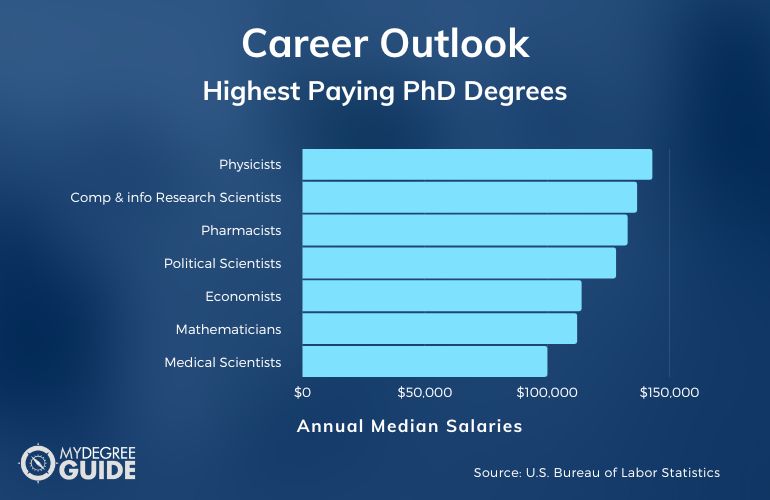
Many careers that require an advanced degree have lucrative median salaries. According to the Bureau of Labor Statistics , here are the median salaries of ten high-paying careers often pursued by people with PhDs:
- Physicists — $142,850
- Computer and information research scientists — $136,620
- Pharmacists — $132,750
- Political scientists — $128,020
- Economists — $113,940
- Mathematicians — $112,110
- Medical scientists — $99,930
- Physical therapists — $97,720
- Clinical and counseling psychologists — $90,130
- Postsecondary business teachers — $88,790
Many factors can affect salaries and job availability, including geographic location, skills, work experience, and your PhD program’s reputation.
Does It Matter Where You Get Your PhD?

The institution you choose for your PhD can impact your academic performance, career trajectory, and personal life.
Choosing a program that offers financial support can give you more time to focus on your studies and develop marketable skills. Additionally, you may find it easier to conduct and publish innovative research with access to leading faculty and top facilities.
Employers often consider a school’s reputation when considering job candidates, so selecting a prestigious program could boost your chances of landing a preferred position.
Earning Your PhD Degree Online

What can I get a PhD in? Colleges and universities offer a broad range of doctoral programs in numerous disciplines. These degrees enable you to study advanced concepts in your chosen field and immerse yourself in the world of academic research.
Graduates use their PhDs to pursue a variety of careers in academia, government agencies, nonprofit organizations, and the private sector. Many jobs that require graduate degrees offer lucrative wages and other benefits, such as academic tenure.
If you want to build your expertise and perform ground-breaking research, you can begin your journey by researching online PhD programs from accredited universities.

More From Forbes
How to be happy—according to new data on generations.
- Share to Facebook
- Share to Twitter
- Share to Linkedin
For happiness, choose activities that bring you together with your people.
If you’re looking for happiness—and who isn’t, these days—you may be most successful by creating experiences that are based on your generation. A new survey finds there are significant differences in how generations spend their time and money to seek (and find!) happiness and great experiences.
And while it may seem fluffy, happiness is a worthy and substantive goal. We are more polarized today than ever, and people are reporting record levels of stress and mental health challenges. But when you’re happy, you tend to be healthier and live longer—and have less depression, anxiety or other mental or emotional challenges. You also tend to perform better at work and achieve more success.
And happiness is contagious as well. When you’re more content, you tend to positively affect others in your community and your network.
In addition, happiness is holistic across work and life. You already know that when you’re happier in your work, you tend to experience positive spillover to your personal life, but the opposite is also true. When you’re happier outside of work, you perceive that you’re happier within work as well.
Here’s how you can get happy—or happier—based on your generation.
Apple iPhone 16 Pro Design Upgrade Shines In New Leak
It s possible the russian army is tricking the ukrainian army with a fake offensive, voters will be heard billionaire mark cuban issues stark warning to joe biden over donald trump s new weapon, get happy with play, like gen z.
When asked how they prefer to spend their extra time and money, Gen Z is 69% more likely to say they want to play games as compared with other generations. They prefer video games, card games and even board games, according to a survey by RYA .
Playing together is a sure path to happiness. In fact, playful activity at work was found to boost productivity by 20%, according to research by Brigham Young University.
Play is powerful because it brings you together with others—virtually or in person—and links you in a common goal. Play offers enough structure and rules for meaningful interaction, at the same time it builds bonds by creating shared experiences.
Feeling connected with your people is a sure path to happiness—and play at work or in your personal life is a great strategy to get there.
Playing together can increase happiness.
Get Happy with Sports, Like Millennials
Interestingly, 33% more millennials than other generations prefer to play sports when they have time outside of work, based on the RYA data. For example, they want to do things like play soccer, tennis or pickleball.
There is good evidence that exercise is good for you and your happiness . In fact, it increases wellbeing and joy, and it reduces anxiety and depression, according to research by the University of Michigan.
And exercise is helpful for all ages. West Virginia University proved a link between exercise and happiness for middle school students and the University of Iowa found that seniors benefitted with improved cognitive function and memory when they exercised.
And sports can also offer the benefit of access to nature—which is also linked with greater wellbeing and happiness. You may play sports inside, but chances are good you’re outside as well. Sweeping research on 301 separate studies across 62 countries published in Science Advances found when you spend time in nature you contribute to cognition and better thinking, more cohesiveness and better communication as well as creativity, character and competence.
Exercise and nature significantly contribute to happiness, so embrace sports.
Get Happy with Entertaining, Like Gen X
Gen X tends to choose hosting or entertaining when they are spending discretionary time or money—and they choose these 12% more than other generations, according to RYA.
This too is a smart way to create the conditions for happiness—by building friendships and connections. In fact, when you have a few close friends its impact on your health (heart disease, blood pressure, cancer, dementia and mental health) is greater than your habits related to diet, exercise or alcohol consumption, and on par with smoking—according to research at Brigham Young University.
And when you host gatherings for your work colleagues, you’ll get an extra benefit, because when people felt more connection with their co-workers, they reduced stress, burnout, loneliness and anxiety, according to data from BetterUp .
Breaking bread together has marked effects on relationships as well. Academic studies by Dr. Robin Dunbar, an evolutionary psychologist, found when people ate together, they enhanced community, trust, satisfaction, happiness and their perceptions that life was worthwhile.
So take a page from the Gen X playbook and create happiness by hosting, entertaining and spending time with friends over a delicious meal.
Get Happy by Volunteering, Like Boomers
Volunteering is also a great way to get happy, and Boomers are 31% more likely to spend their time here as compared with other generations, according to the RYA data.
Volunteering contributes to happiness because it focuses you on helping others, which is proven through research to increase your feelings of joy and satisfaction .
In addition, when people volunteered , 45% experienced a greater sense of purpose, 36% felt happier, 26% improved their mental wellbeing, 20% had higher self-confidence and self-esteem and 11% reduced their stress, according to a survey by BioLife .
So seek opportunities to volunteer, help in your community and contribute your talents to others—for greater happiness.
Do What You Love
When you do what you love, either within your work or outside of work, you’ll contribute to happiness. So regardless of your generation, embrace the activities that energize you and you’ll reap greater happiness for yourself and for others as well.

- Editorial Standards
- Reprints & Permissions
Join The Conversation
One Community. Many Voices. Create a free account to share your thoughts.
Forbes Community Guidelines
Our community is about connecting people through open and thoughtful conversations. We want our readers to share their views and exchange ideas and facts in a safe space.
In order to do so, please follow the posting rules in our site's Terms of Service. We've summarized some of those key rules below. Simply put, keep it civil.
Your post will be rejected if we notice that it seems to contain:
- False or intentionally out-of-context or misleading information
- Insults, profanity, incoherent, obscene or inflammatory language or threats of any kind
- Attacks on the identity of other commenters or the article's author
- Content that otherwise violates our site's terms.
User accounts will be blocked if we notice or believe that users are engaged in:
- Continuous attempts to re-post comments that have been previously moderated/rejected
- Racist, sexist, homophobic or other discriminatory comments
- Attempts or tactics that put the site security at risk
- Actions that otherwise violate our site's terms.
So, how can you be a power user?
- Stay on topic and share your insights
- Feel free to be clear and thoughtful to get your point across
- ‘Like’ or ‘Dislike’ to show your point of view.
- Protect your community.
- Use the report tool to alert us when someone breaks the rules.
Thanks for reading our community guidelines. Please read the full list of posting rules found in our site's Terms of Service.
Today’s best savings rates
Top savings rates remain high – for now, how fed decisions affect savings rates, why you should open a high-yield savings account today , how to choose the best high-yield savings account , methodology, best savings rates today -- grow your savings faster with apys up to 5.55%, may 9, 2024.
Don't waste your time with a traditional savings account that earns a paltry APY.

Liliana Hall
Associate Writer
Liliana Hall is a writer for CNET Money covering banking, credit cards and mortgages. Previously, she wrote about personal credit for Bankrate and CreditCards.com. She is passionate about providing accessible content to enhance financial literacy. She graduated from the University of Texas at Austin with a bachelor's degree in journalism, and has worked in the newsrooms of KUT and the Austin Chronicle. When not working, she is probably paddle boarding, hopping on a flight or reading for her book club.
Kelly Ernst
Kelly is an editor for CNET Money focusing on banking. She has over 10 years of experience in personal finance and previously wrote for CBS MoneyWatch covering banking, investing, insurance and home equity products. She is passionate about arming consumers with the tools they need to take control of their financial lives. In her free time, she enjoys binging podcasts, scouring thrift stores for unique home décor and spoiling the heck out of her dogs.
CNET staff -- not advertisers, partners or business interests -- determine how we review the products and services we cover. If you buy through our links, we may get paid.
Savings accounts provide a safe place to grow your money while allowing easy access to your funds. But if you’re serious about maximizing your savings, a traditional savings account won’t cut it.

Currently, traditional savings accounts earn annual percentage yields, or APYs, as low as 0.01%. But the best high-yield savings accounts earn APYs up to 5.55% -- more than 10 times the national average of 0.46%. So, if you’re earning less than 1% APY, you’re missing out. Even if the rate environment shifts in the next several months, an HYSA can always be a smart savings strategy.
Read on to learn where you can find today’s top savings rates.
Key takeaways
- Today’s best high-yield savings accounts earn up to 5.55% APY.
- A high-yield savings account with a competitive APY can help you grow your money faster.
- Before you choose a high-yield savings account, consider more than just the APY. Look at minimum deposit requirements, fees and withdrawal limits.
Experts recommend comparing rates before opening a savings account to get the best APY possible. You can enter your information below to see CNET’s partners’ rates in your area.
Here are some of the top savings account APYs available right now:
The Fed opted to keep the federal funds rate where it is at last week’s FOMC meeting, maintaining its target range of 5.25% to 5.50%. For savers, this means top savings rates will likely remain elevated -- for now.
The best high-yield savings accounts currently earn APYs up to 5.55%, but some banks are already quietly lowering their rates. For example, Ally decreased its high-yield savings account rate from 4.25% down to 4.20% on April 18, and CIT Bank decreased its rate from 5.05% to 5.00% on May 3. Experts expected several rate cuts to happen later this year, which would prompt savings rates to follow suit. But the most recent Consumer Price Index report revealed an uptick in inflation, leaving the timeline for future rate cuts unclear.
“The elevated March inflation numbers have greatly reduced the odds of three Fed rate cuts in 2024,” said Ken Tumin, senior industry analyst at LendingTree. “One or two Fed rate cuts still look probable in the second half of 2024.”
However, some economists predict that rate cuts are now less likely to happen in 2024 unless inflation begins trending downward soon. Either way, you can expect high savings rates to stick around for the foreseeable future.
The Fed doesn’t directly impact savings rates, but its decisions have ripple effects. For instance, when the Fed raises rates, many banks increase their rates for traditional and high-yield savings accounts, said Lanesha Mohip, a corporate accountant, founder of the Polished CEO and CNET expert review board member. Inversely, when the Fed lowers rates, banks drop savings rates, too. But wherever rates stand, you’ll earn more yield with a high-yield savings account than a traditional one.
Banks can change the interest rates on savings accounts at any time. Since savings rates are variable, your APY will likely go down once the Fed drops rates. But for now, many banks are holding rates steady in anticipation of what the Fed will do next. Based on CNET’s weekly tracking, here’s where rates stand compared to last week:
Earning a high interest rate on your savings is great, but having money available for future goals and emergencies is even more important. You may open a high-yield savings account to get into the habit of saving with regular automatic contributions toward your emergency or sinking fund as a set-it-and-forget-it method. It could also be a good place to stash monetary windfalls, such as your tax refund . Here’s what else makes HYSAs stand out:
- High rates: HYSAs often have APYs 10 times higher (or more) than the national average, as tracked by the Federal Deposit Insurance Corporation.
- Low or no fees: Monthly maintenance fees can eat into your savings. Many online banks can charge low or no fees thanks to their lower operating costs.
- Liquidity: You can access money in your HYSA anytime without penalty (as long as you mind any withdrawal limits).
- Accessibility: If you open an HYSA at an online bank, you’ll have 24/7 access through its mobile app. You may also have lots of customer service options, including by phone, online chat and secure messaging.
- Low risk: HYSAs are protected by federal deposit insurance if they’re held at an FDIC-insured bank or credit union insured by the National Credit Union Administration. That means your money is safe up to $250,000 per account holder, per account type.
Smart Money Advice on the Topics That Matter to You
CNET Money brings financial insights, trends and news to your inbox every Wednesday.
By signing up, you will receive newsletters and promotional content and agree to our Terms of Use and acknowledge the data practices in our Privacy Policy . You may unsubscribe at any time.
Your new Subscription
Here’s all of the excitement headed to your inbox.
High-yield savings accounts usually have higher APYs than traditional savings accounts, which helps you earn a bigger return. But don’t stop with the rate. There are other factors you should consider when choosing the right savings accounts for your savings goals, including the following:
- Minimum deposit requirements: Some HYSAs require a minimum amount to open an account -- typically, from $25 to $100. Others don’t require anything.
- ATM access: Not every bank offers cash deposits and withdrawals. If you need regular ATM access, check to see if your bank offers ATM fee reimbursements or a wide range of in-network ATMs, said Mohip.
- Fees: Look out for fees for monthly maintenance, withdrawals and paper statements, said Mohip. The charges can eat into your balance.
- Accessibility: If you prefer in-person assistance, look for a bank with physical branches. If you’re comfortable managing your money digitally, consider an online bank.
- Withdrawal limits: Some banks charge an excess withdrawal fee if you make more than six monthly withdrawals. If you think you may need to make more, consider a bank without this limit.
- Federal deposit insurance: Make sure your bank or credit union is either insured with the FDIC or the NCUA. This way, your money is protected up to $250,000 per account holder, per category, if there’s a bank failure.
- Customer service: Choose a bank that’s responsive and makes it easy to get help with your account if you need it. Read online customer reviews and contact the bank’s customer service to get a feel for working with the bank.
CNET reviewed savings accounts at more than 50 traditional and online banks, credit unions and financial institutions with nationwide services. Each account received a score between one (lowest) and five (highest). The savings accounts listed here are all insured up to $250,000 per person, per account category, per institution, by the FDIC or NCUA.
CNET evaluates the best savings accounts using a set of established criteria that compares annual percentage yields, monthly fees, minimum deposits or balances and access to physical branches. None of the banks on our list charge monthly maintenance fees. An account will rank higher for offering any of the following perks:
- Account bonuses
- Automated savings features
- Wealth management consulting/coaching services
- Cash deposits
- Extensive ATM networks and/or ATM rebates for out-of-network ATM use
A savings account may be rated lower if it doesn’t have an easy-to-navigate website or if it doesn’t offer helpful features like an ATM card. Accounts that impose restrictive residency requirements or fees for exceeding monthly transaction limits may also be rated lower.
Recommended Articles
Best high-yield savings accounts for may 2024, the fed’s rate pause is good news for savers. here’s why, i bond rates are down. does that mean you should choose a cd instead, money anxiety here’s the expert advice i followed to get smart with my finances, steal this accountant’s tips for saving $2,000 or more a year without giving up your daily coffee, are gen z money trends giving you deja vu that’s because they’re boomer financial fads.
CNET editors independently choose every product and service we cover. Though we can’t review every available financial company or offer, we strive to make comprehensive, rigorous comparisons in order to highlight the best of them. For many of these products and services, we earn a commission. The compensation we receive may impact how products and links appear on our site.
Writers and editors and produce editorial content with the objective to provide accurate and unbiased information. A separate team is responsible for placing paid links and advertisements, creating a firewall between our affiliate partners and our editorial team. Our editorial team does not receive direct compensation from advertisers.
CNET Money is an advertising-supported publisher and comparison service. We’re compensated in exchange for placement of sponsored products and services, or when you click on certain links posted on our site. Therefore, this compensation may impact where and in what order affiliate links appear within advertising units. While we strive to provide a wide range of products and services, CNET Money does not include information about every financial or credit product or service.

IMAGES
VIDEO
COMMENTS
Yes it matters. Either the Univ or Prof should have a good reputation. If you have done your PhD from anywhere, it will be a mark in your CV. A PhD from Harvard makes a lot of diff when compared to a PhD from xyz small city/country. Similarly a PhD under a Nobel laureate will be highly valuable than a Prof xyz.
Advertisement. There is a lot at stake when choosing where to do your postdoc or Ph.D. Choosing a lab that is excellent scientifically should allow you to do excellent research, publish in excellent journals, and network with other excellent researchers. At the same time, doing research is a very intense personal experience that involves ...
A PhD from a highly ranked school doesn't automatically guarantee a higher starting salary after graduation, or that you will suddenly be put at the top of the pile of interviewees for a tenure-track position. In fact, when hiring committees look at freshly minted PhDs to fill a tenure-track position, they mainly look at the relevance and ...
To wrap up, it would be inaccurate to say that the reputation of a university doesn't matter at all when it comes to choosing where you should do your PhD. There will doubtless be some correlation between the ranking of an institution and how good its research opportunities are likely to be, as well as the doors a doctorate from there might ...
9. There are no real breaks. In a stereotypical "9-to-5" job, when the workday is over or the weekend arrives, you can generally forget about your work. And a vacation provides an even longer respite. But in a PhD program, your schedule becomes "whenever you find time to get your work done."
Your GPA in undergrad is the single most important factor in PhD admissions. If your GPA is too low your application will be dismissed out of hand. While there are no hard limits, we suggest a minimum GPA of 3.5 for serious contention, especially at top schools. If your GPA is below 3.0 then you will likely not get admitted into any PhD programs.
But, the financial commitment is often offset by the earning potential of a PhD. On average, PhDs make over $30,000 more annually than those holding only a bachelor's degree, but keep in mind that number varies between the humanities, business, and science industries. The energy commitment: earning a PhD can be hard work.
Choosing Where to Do a PhD. Finding the best university for a PhD can seem daunting. After all, your choice of university will determine not only where you will be living and studying for the next three to five years, but also what that experience is going to be like. There are many factors to consider when deciding where to study a PhD.
5 Ways Where You Get Your PhD Does Not Really Matter Its Your Research, Not University. The essence of a PhD is your research. What truly sets you apart is the quality and impact of your work, not just the university's emblem on your diploma.
Why does the prestige of where a tenure-track faculty member got their PhD matter so much to hiring committees? My guess is that universities want to be more like the prestigious universities, so by hiring people who went to those universities, they can claim that they are similar. job-search; tenure-track;
Reasons to get a PhD. Earning your PhD can be an immensely rewarding experience, but the degree can be a big commitment, requiring significant time, money, and work. Here are some more reasons you may want to pursue a PhD: Become a subject matter expert in a particular field. Conduct the research you are passionate about.
Well, not quite. For the simple reason that, whatever the worth of a completed PhD, an uncompleted one is worth a lot less. It doesn't matter what you plan to do with your PhD or how much it ends up costing you: if you don't finish your project you'll have little to show for whatever time and money you have invested.
What Grad Schools Think of Applicants. It is appealing to a graduate school if a student can think critically and be independent at a large university, experts say. Students who attended lower ...
Your PhD will likely take an additional 4 to 6 years after earning your master's degree. Con: A master's degree is usually unfunded. Many students find this a big con: Master's students usually do not receive much funding. Most master's programs are paid for out-of-pocket.
Yes it matters where are you did your PhD in graduate school. There are strong affects that show where you did your graduate school will often dictate what p...
Does It Matter Where You Get Your PhD? The institution you choose for your PhD can impact your academic performance, career trajectory, and personal life. Choosing a program that offers financial support can give you more time to focus on your studies and develop marketable skills. Additionally, you may find it easier to conduct and publish ...
When you are a PhD student, the grades will matter until after you've completed your "qualification" process, in whatever form that takes. If you do well on the exams, then your grades don't matter much; if you're "on the bubble," you might be helped by solid performance in your graduate coursework. Where grades continue to matter are:
Thanks for your honesty. I had some advice from people telling me 'it doesn't matter where you go for your PhD' and 'don't go to Oxbridge, they are the worst'. The people who say those kind of things usually have a chip on their shoulder and can't be trusted. I think 'brand names' do matter, even if people don't like it. I took the bad advice and am now completing a fully funded PhD at a ...
Get Happy with Play, Like Gen Z. When asked how they prefer to spend their extra time and money, Gen Z is 69% more likely to say they want to play games as compared with other generations.
Liquidity: You can access money in your HYSA anytime without penalty (as long as you mind any withdrawal limits). Accessibility: If you open an HYSA at an online bank, you'll have 24/7 access ...